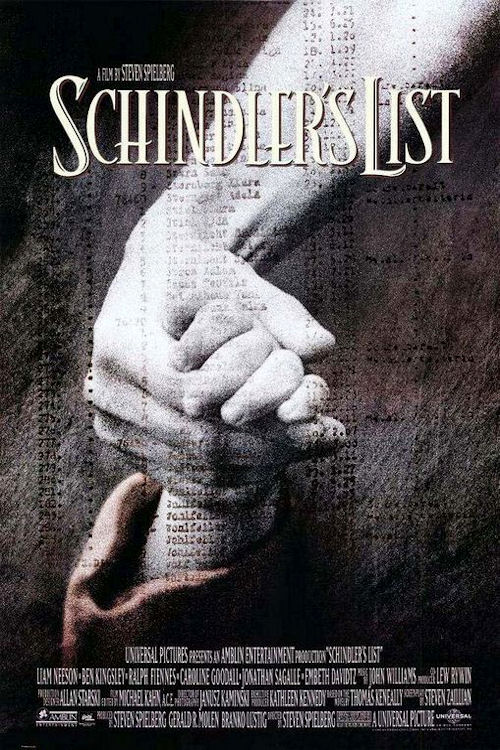Anthony's Film Review
Schindler's List (1993)

Schindler's List is a true Steven Spielberg masterpiece, not to mention a very moving historical epic...
The quality of Hollywood movies can range from hopelessly abysmal to incredibly flawless. If you put aside the bad ones, most of the good ones are just good to very good. But once in a while, a movie comes along that is so perfect and flawless in every way that it no doubt represents the best of what filmmaking can produce. There is no one film that is greater than all others, and people will have different opinions about their all-time favorite movies. Still, if you're looking for a really, really great movie and you want to focus on the end of the 20th century, look no further than Steven Spielberg's 1993 epic historical drama Schindler's List.
This is a film in which every element works very well. The story is moving, the dialogue is engaging, the acting is superb, the cinematography is gorgeous, and the themes are powerful and timeless. This is also perhaps the best movie ever made that is related to the Holocaust during World War II when the Nazis in Germany systematically persecuted, mistreated, and murdered millions of Jews in one of the worst crimes to humanity in history. You can definitely consider Schindler's List to be the quintessential Holocaust drama film.
A good portion of the first half of the movie chronicles the journey of imprisoned Jews after Germany defeats Poland in the late 1930s. First, they are ordered to leave their homes and register their names with the Nazi regime. Then they are forced into a Krakow ghetto with substandard living conditions. Throughout this, there is a sense that the Jews are trying to make the best out of their situation and hoping for the best. That is, until the Nazis begin a violent liquidation of the ghetto. Any Jews still living are ultimately taken to a forced labor camp where any deviation from the rules guarantees death from the militia holding them captive.
As all of this is happening, a German businessman named Oskar Schindler (played by Liam Neeson) is enjoying his life. He attends lavish parties, meets beautiful women (though he is married), and chats with fellow members of the German military. For work, he assumes control of a factory making items such as pots and pans. Part of the Nazi policy against Jews is that the Germans have the right to take away their businesses, employ them as slave labor, and collect all of the wealth from these businesses. Oskar Schindler is basically like every other person. He is a member of the Nazi party and he is motivated by profit and personal gain.
But after much time passes in this three-hour epic film, one thing eventually becomes clear. Unlike other Nazis, Schindler doesn't mistreat any Jews. At first, the reason for this is practical. He knows that his business would suffer if even one Jew gets murdered senselessly. But later, Schindler seems to have a change in heart. When the Nazis massacre Jews at the Krakow ghetto, Schindler watches the horrifying sights from a hill above. One sight in particular captures his attention: a little girl in a red dress. What's remarkable is that the red dress is the only color that we see in this otherwise predominantly black-and-white movie. What this symbolizes is up to viewer interpretation.
I can think of two other things that show Schindler's humanity coming forth. At the factory, his most trusted worker is a Jewish accountant named Itzhak Stern (played by Ben Kingsley). The scenes featuring Schindler and Stern paint pictures of partnership that borders on friendship. Also, a Jew comes to the factory applying for a job, but confesses to Schindler that what she really wants is for Schindler to hire her parents to work in the factory, because no Jew dies in this place. Schindler is reluctant at first, but later, he orders that those specific Jews are pulled from the labor camp to be hired in the factory.
I like to think of the second half of the movie as a stalemate between good and evil. Schindler continues to treat his Jews with dignity while bribing SS officers for his own safety. Meanwhile, the mistreatment of Jews continues elsewhere, especially with the cold and sadistic SS officer named Amon Goeth (played by Ralph Fiennes) who enjoys killing prisoners. But even with horrifying atrocities against Jews, Schindler's unconscious acts of kindness are far more powerful. This is especially true with the climax in which he asks Stern to put together the list of his worker Jews in an effort to maintain control over them instead of letting them fall into the ruthless hands of the SS.
Just when you think this epic drama could not get any more breathtaking, there is still one more scene that captures the heart. I will not go into detail because it's something you have to see for yourself, but it's the final scene that is presented in color after transitioning from the preceding black-and-white shot. This is an undeniably creative way to pay tribute to Oskar Schindler and all the Jews, not just Schindler's (who amount to over 1,200), who were victimized during the Holocaust. I have never EVER seen a film ending as moving as this one. It is the perfect way to wrap up this masterpiece historical epic that director Steven Spielberg should be proud of. And I am very sure that this movie will live on for years because of its timeless messages about humanity.
Anthony's Rating:










For more information about Schindler's List, visit the Internet Movie Database.
Home
Film Reviews
Other Reviews
Commentaries
Links
About AFR
RSS Feed
Privacy Policy
E-mail Anthony











